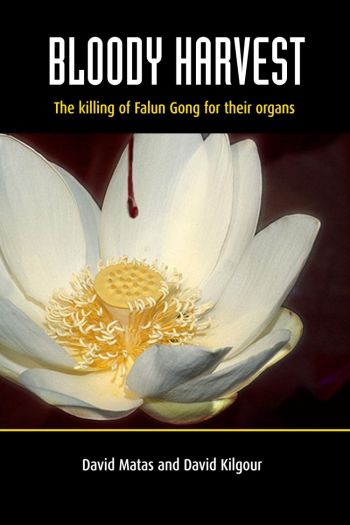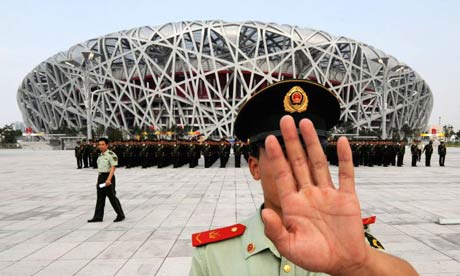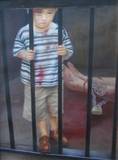By EDWARD WONG, New York Times, USA, September 28, 2008-
KASHGAR, China — Just days before the Olympic Games began in August, a truck plowed into a large group of paramilitary officers jogging in western China, sending bodies flying, Chinese officials said at the time.
They described the event as a terrorist attack carried out by two ethnic Uighur separatists aimed at disrupting the Olympics. After running over the officers, the men also attacked them with machetes and homemade explosives, officials said. At least 16 officers were killed, they said, in what appeared to be the deadliest assault in China since the 1990s.
But fresh accounts told to The New York Times by three foreign tourists who happened to be in the area challenge central parts of the official Chinese version of the events of Aug. 4 in Kashgar, a former Silk Road post in the western desert. One tourist took 27 photographs.
Among other discrepancies, the witnesses said that they heard no loud explosions and that the men wielding the machetes appeared to be paramilitary officers who were attacking other uniformed men.
That raises several questions: Why were the police wielding machetes? Were they retaliating against assailants who had managed to obtain official uniforms? Had the attackers infiltrated the police unit, or was this a conflict between police officers?
“It seemed that the policeman was fighting with another policeman,” one witness said. All of the witnesses spoke on condition of anonymity for fear of running afoul of the Chinese authorities.
Chinese officials have declined to say anything more about the event, which was the first in a series of four assaults in August in which officials blamed separatists in the Xinjiang autonomous region. The attacks left at least 22 security officers and one civilian dead, according to official reports.
On Aug. 5, the party secretary of Kashgar, Shi Dagang, said that the attack the previous day on the police officers, which also injured 16, was carried out by two Uighur men, a taxi driver and a vegetable seller. The Uighurs are a Turkic Muslim group that calls Xinjiang its homeland and often bridles at Han Chinese rule.
One man drove the truck, Mr. Shi said, and the other ran up to the scene with weapons. The attackers, who were arrested, had each tossed an explosive and when they were captured had a total of nine unused explosive devices, machetes, daggers and a homemade gun, he said.
He never mentioned attackers in security uniforms. Neither did reports by Xinhua, the state news agency. One publication, the North American edition of a Hong Kong newspaper, Ming Pao, did, citing police officials in Xinjiang, who now refuse to elaborate on the events.
Chinese officials have long sought to portray violence in Xinjiang as a black-and-white conflict, with separatist groups collectively known as the East Turkestan Islamic Movement carrying out attacks. Officials cite the threat of terrorism when imposing strict security measures on the region.
But the ambiguities of the scene described by the witnesses suggest that there could be different angles to the violence. When asked whether terrorists were involved, a Uighur man who on Friday drove past the scene of the attack said, “They say one thing, we say something else.” Other Uighurs say the attackers were acting on their own, perhaps out of a personal grievance.
The three witnesses said they had seen the events from the Barony Hotel, which sits across the street from a compound of the People’s Armed Police, China’s largest paramilitary force, and another hotel outside of which the attack occurred.
One tourist took photographs, three of which were distributed by The Associated Press in August. He showed 24 others to The Times.
At around 8 a.m. on Aug. 4, the photographer was packing his bags by the window when he heard a crashing sound, he said. When he looked up, he said, he saw a large truck career into a group of officers across the street after having just hit a short yellow pole.
Chinese officials said later that the truck had barreled into 70 officers jogging away from the compound.
The photographer said that the truck then hit a telephone or power pole and slammed into the front of the other hotel, the Yiquan, across the street. A man wearing a white short-sleeve shirt tumbled from the driver’s side, he said.
“He was pretty injured,” the photographer said. “He fell onto the ground after opening the door. He wasn’t getting up. He was crawling around for four or five seconds.”
The photographer raced into the hallway to get his traveling companions, a relative and a friend, from another room.
The two others had also heard the crash and were already in the hallway. All three dashed to the window in the photographer’s room. The photographer said he had been gone for about a minute. Back at the window, he said, he saw no sign of the truck driver.
The friend said: “The first thing I remember seeing was that truck in the wall in the building across the street. I saw a pile of about 15 people. All their limbs were twisted every which way. There was a gentleman whose head was pressed against the pavement with a big puddle of blood.”
“I remember just thinking, ‘It’s surreal,’ ” he said. “I had this surreal feeling: What is really happening?”
The tourists said the scene turned even more bizarre.
One or two men dressed in green uniforms took out machetes and began hacking away at one or two other men dressed in the same type of uniforms on the ground.
“A lot of confusion came when two gentlemen, it looked like they were military officers — they were wearing military uniforms, too — and it looked like they were hitting other military people on the ground with machetes,” the friend said.
“That instantly confused us,” he said. “All three of us were wondering: ‘Why are they hitting other military people?’ ”
The photographer grabbed a camera for the first time and crouched down by the window. His first photograph has a digital time stamp of 8:04 a.m., and his last is at 8:07 a.m. The first frames are blurry, and the action is mostly obscured by a tree. But it is clear that there are several police officers surrounding one or more figures by the sidewalk.
The photographer said that there had been two men in green uniforms on their knees facing his hotel and their hands seemed to be bound behind their backs. Another uniformed man began hitting one of them with a machete, he said.
“The guy who was receiving the hack was covered in blood,” he said. “A lot of the policemen were covered in blood. Some were walking around on the street pretty aimlessly. Some were sitting on the curb, in shock I guess. Some were running around holding their necks.”
The friend recalled a slightly different version of the event. He said he had seen two uniformed men with machetes hacking away at two men lying on their backs. “I do kind of remember one of them moving,” he said. “He was definitely injured but still kind of trying to squirm around.”
The relative also saw something different. He said a man in a green uniform walked from the direction of the truck. “A policeman who wasn’t injured ran over and started hitting him with a machete,” the relative said. “He hit him a few times, then this guy started fighting him back.”
After being hit several times by the machete, the uniformed man fell down, and at least one other police officer came over to kick him, the relative said.
It became clear to the tourists that the men with machetes were almost certainly paramilitary officers, and not insurgents, because they mingled freely with other officers on the scene.
While all this was happening, the three tourists said, a small bang came from the truck. It sounded like a car backfiring, the friend said. Black smoke billowed from the front of the truck.
The machete attack lasted a minute or two, the tourists said. One uniformed man then handed his machete to another uniformed man who had a machete, the friend said. One of the photographs shows a man walking around clutching two machetes in one hand. Another photograph shows a uniformed man carrying a rifle with a bayonet, a rare weapon in China.
Other officers were trying to disperse civilian onlookers, the tourists said. One of the officers saw the photographer with his camera in his hotel room window, the tourists said.
For about five hours after that, police officers locked down the hotel and went room to room questioning people, the tourists said. They seemed unthreatening, the tourists said, but they kept asking about photographs and checking cameras.
“They asked if we took any pictures; we said no,” the relative said. The tourists had stuffed the camera into a bag. “They asked if we sent any e-mails. I said no.”
The photographer said that while at breakfast, he saw white body bags on gurneys being wheeled to vans. In the afternoon, when people were finally allowed to leave the hotel, workers were spraying down the street with hoses, he said.
The truck was gone. Except for a bent pole across the street, there was no sign that anything had happened.
– New York Times: Doubt Arises in Account of an Attack in China












 to discredit the peaceful protests of Buddhist monks.
to discredit the peaceful protests of Buddhist monks.
